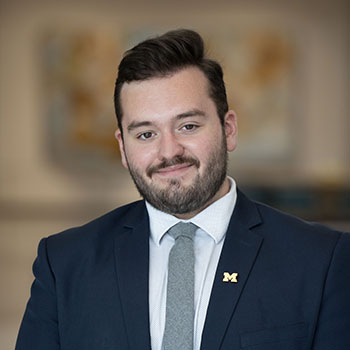
Five predoctoral CEE students receive Rackham Predoctoral Fellowships
Five CEE predoctoral students have received Rackham Predoctoral Fellowships through the Rackham Graduate School.

Five CEE predoctoral students have received Rackham Predoctoral Fellowships through the Rackham Graduate School.
Predoctoral CEE students, Sampurna Datta, Da Li, Nicole Rockey, Shilva Shrestha and Zhengtian Xu, have received Rackham Predoctoral Fellowships from the Rackham Graduate School.
The Rackham Predoctoral Fellowship supports outstanding doctoral students who have achieved candidacy and are actively working on dissertation research and writing. The program seeks to support students working on dissertations that are unusually creative, ambitious and impactful. These fellowships are for three terms of full support to PhD students in their final phase of dissertation writing and research. Fellowships include a stipend and covered candidacy tuition and required fees for twelve months.

Datta’s research aims to promote a shift in waste management practices by transforming landfills from containment facilities to energy reactors. With proper control, degradation of waste in landfills can become efficient, generating bio-gas at high rates, thus becoming a sustainable source for power and heat generation. To promote energy generation from landfills, a high performance model is developed which captures the dynamics of the evolving physical-biochemical-mechanical processes during degradation. The model is calibrated against unique large-size laboratory experiments, and then scaled-up using data from field monitoring sensors, to guide decision-making of landfill operations towards optimizing energy generation. Datta is advised by Associate Professor Dimitrios Zekkos.

Li’s research spurs synergistic efforts to address a fundamental research problem that currently impedes advancements in automated occupant-sensitive control of building systems due to the lack of adequate non-intrusive data collection and evaluation algorithms suitable for both single and multi-occupancy indoor spaces. Success in his work has the potential to spawn a long-term research program aimed at transitioning building system control from a passive and user-empirical process to an automated, occupant-centric and data-driven mechanism that can simultaneously improve occupant satisfaction in indoor environments while reducing energy consumption. Li is advised by Associate Professor Carol Menassa.

Rockey’s research focuses on direct potable reuse (DPR), an advanced technology that transforms wastewater into drinking water and that requires extensive and consistent pathogen removal to ensure public health. Viral pathogens are of principal concern in DPR because they can be present in elevated concentrations in wastewater and are highly infectious. Rockey’s goal is to improve upon the methods used to characterize viral pathogen removal through unit processes. This research will combine several emerging microbiological methods, including digital PCR, flow virometry, and novel cell culture systems. Her work will aid in the development of a regulatory framework for DPR and in turn make treatment more feasible, economical and sustainable while still guaranteeing public health protection. Rockey is advised by Professor Lutgarde Raskin and Assistant Professor Krista Wigginton.

Shrestha’s research focuses on recovering high-value chemicals from organic waste, particularly brewery waste. She is focusing on brewery waste because the increase in the number of breweries in the U.S. is creating considerable challenges for waste management. In rural communities, breweries are often the largest producers of wastewater to be treated by municipal water resource recovery facilities, with such discharge fees constituting 8-22% of the total utility operating costs. Implementing biotechnologies to recover resources from waste provides opportunities for revenue in addition to reduced environmental impacts through waste treatment. Shrestha is working towards developing a technology that relies on anaerobic fermentation by a mixed-culture microbial community for recovering medium chain carboxylic acids (MCCAs) from brewery waste. MCCAs are used as platform chemicals serving as building blocks for production of liquid fuels, and several other industrial and agricultural products. Shrestha is advised by Professor Lutgarde Raskin.

Xu’s research focuses on the proliferation of smartphones. Smartphones have catalyzed rapid growth of ride-sourcing services, such as Uber, Lyft and Didi Chuxing. Such on-demand e-hailing services significantly reduce the meeting frictions between drivers and riders and endow the platform with unprecedented flexibilities and challenges in system management. Xu contributes to the ongoing quest of modeling, examining and managing the ride-sourcing services by concentrating on the supply state of the system. He aims to study the underlying physics behind the service operations, to understand the system behaviors under different strategies and policies, and to target the issues that can potentially undermine the system supply. Various control strategies are further proposed to guide and strengthen the supply management for ride-sourcing services in practice. Xu is advised by Professor Yafeng Yin.
Congratulations to these five outstanding predoctoral students!

Marketing Communications Specialist
Department of Civil and Environmental Engineering